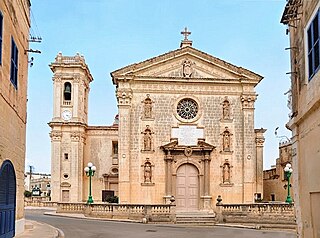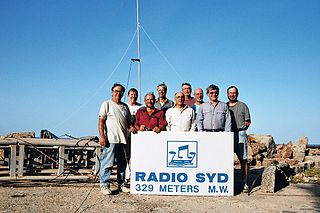
Attard is a town in the Central Region of Malta. Together with Balzan and Lija it forms part of "the Three Villages" and has been inhabited since the Classical Period. It has a population of 12,268 as of 2021. Attard's traditional Latin motto is Florigera rosis halo due to its many flower gardens and citrus orchards. Attard is abundant with public gardens. The inhabitants of Attard are known as saraċini.
The American Radio Relay League (ARRL) is the largest membership association of amateur radio enthusiasts in the United States. ARRL is a non-profit organization, and was co-founded on April 6, 1914, by Hiram Percy Maxim and Clarence D. Tuska of Hartford, Connecticut. The ARRL represents the interests of amateur radio operators before federal regulatory bodies, provides technical advice and assistance to amateur radio enthusiasts, supports a number of educational programs and sponsors emergency communications service throughout the country. The ARRL has approximately 161,000 members. In addition to members in the US, the organization claims over 7,000 members in other countries. The ARRL publishes many books and a monthly membership journal called QST.

A DX-pedition is an expedition to what is considered an exotic place by amateur radio operators and DX listeners, typically because of its remoteness, access restrictions, or simply because there are very few radio amateurs active from that place. This could be an island, a country, or even a particular spot on a geographical grid. DX is a telegraphic shorthand for "distance" or "distant".

Radio Amateurs of Canada (RAC), known in French as Radio Amateurs du Canada, is the national association for Amateur Radio in Canada. It is a not-for-profit membership association with headquarters in Ottawa, Ontario, Canada, representing the interests of Amateur Radio all across Canada. Speaking on behalf of Canadian Radio Amateurs, RAC provides liaison with government agencies and carries the Amateur voice about regulatory and spectrum issues to the discussion table with government and industry leaders, nationally and internationally.
DXing, taken from DX, the telegraphic shorthand for "distance" or "distant", is the hobby of receiving and identifying distant radio or television signals, or making two-way radio contact with distant stations in amateur radio, citizens band radio or other two-way radio communications. Many DXers also attempt to obtain written verifications of reception or contact, sometimes referred to as "QSLs" or "veries".
In broadcasting and radio communications, a call sign is a unique identifier for a transmitter station. A call sign can be formally assigned by a government agency, informally adopted by individuals or organizations, or even cryptographically encoded to disguise a station's identity.

An amateur radio operating award is earned by an amateur radio operator for establishing two-way communication with other amateur radio stations. Awards are sponsored by national amateur radio societies, radio enthusiast magazines, or amateur radio clubs, and aim to promote activity on the amateur radio bands. Each award has its own set of rules and fees. Some awards require the amateur radio operator to have contacted other stations in a certain number of countries, Maidenhead grid locators, or counties. Because amateur radio operators are forbidden by regulation to accept financial compensation for their on-air activity, award recipients generally only receive a certificate, wooden plaque, or a small trophy as recognition of their award.

Amateur radio international reciprocal operating agreements permit amateur radio operators (hams) from one country to operate a station whilst traveling in another without the need to obtain additional licenses or permits.
The New Zealand Association of Radio Transmitters (NZART) is a non-profit organisation of amateur radio enthusiasts in New Zealand. It represents New Zealand amateur radio operators nationally and internationally. NZART is a founding member of the International Amateur Radio Union. It is an association of individual members, however those members are encouraged to form local branches.

The Trinidad and Tobago Amateur Radio Society, Inc. (TTARS) is the national amateur radio organization in the Republic of Trinidad and Tobago. It is a member society of the International Amateur Radio Union (IARU).
The South African Radio League (SARL), formerly known as the South African Radio Relay League (SARRL), is a non-profit organisation representing the interests of amateur radio enthusiasts in South Africa. The SARL advocates on behalf of its membership and all licensed amateur radio operators in South Africa as the representative of amateur radio to the South African government. This has included the promotion of deregulation and simplification of the amateur radio service, and expansion of the number of amateur radio operators in Southern Africa. The SARL publicises and promotes the role of amateur radio in society, and promotes the use of amateur radio in schools as an entry point into the fields of science and technology. The SARL publishes a magazine called Radio ZS twelve times a year. SARL is the national Member Society representing South Africa in the International Amateur Radio Union and is a Member Society in IARU Region 1.

A QSL card is a written confirmation of either a two-way radiocommunication between two amateur radio or citizens band stations; a one-way reception of a signal from an AM radio, FM radio, television or shortwave broadcasting station; or the reception of a two-way radiocommunication by a third party listener. A typical QSL card is the same size and made from the same material as a typical postcard, and most are sent through the mail as such.

The International Amateur Radio Club(IARC) maintains and operates the amateur radio station 4U1ITU at the International Telecommunication Union building in Geneva, Switzerland. Intended to serve as a model of amateur radio operation, the station was created under the auspices of the Secretary-General of the United Nations and the Secretary-General of the International Telecommunication Union (ITU).

Founded in 2000 by Jim Weidner, K2JXW, the Amateur Radio Lighthouse Society (ARLHS) is devoted to maritime communications, amateur radio, lighthouses, and lightships. Its members travel to lighthouses around the world where they operate amateur radio equipment at or near the light. Collecting lighthouse QSLs is popular for some amateur radio operators. ARLHS is a membership organization with over 1665 members worldwide as of July 2009.
The Irish Radio Transmitters Society (IRTS) is a national non-profit organization for amateur radio enthusiasts in Ireland. Key missions of the IRTS include promoting amateur radio experimentation and representing the interests of Irish amateur radio operators before Irish and international telecommunications regulatory authorities. In particular, since 2005 in agreement with Communications Regulator (Comreg), the IRTS supports the entire examination process for the Experimenter's Licence including setting, organising, and correcting examinations for the Irish amateur radio license. The organization has no paid employees, and all tasks are performed by volunteers. IRTS is the national member society representing Ireland in the International Amateur Radio Union.

Amateur radio, also known as ham radio, is the use of the radio frequency spectrum for purposes of non-commercial exchange of messages, wireless experimentation, self-training, private recreation, radiosport, contesting, and emergency communications. The term "amateur" is used to specify "a duly authorized person interested in radioelectric practice with a purely personal aim and without pecuniary interest"; and to differentiate it from commercial broadcasting, public safety, or professional two-way radio services.
Amateur radio call signs are allocated to amateur radio operators around the world. The call signs are used to legally identify the station or operator, with some countries requiring the station call sign to always be used and others allowing the operator call sign instead.
The Canadian Forces Affiliate Radio System was established in 1978. The programme enlists amateur radio volunteer operators and equipment but uses neither standard radioamateur frequencies nor callsigns as CFARS is allocated its own specific official frequencies and identifiers.
Call signs in Asia are rarely used to identify broadcast stations. In most Asian countries, broadcast stations use other forms of identification. Japan, South Korea, Indonesia, the Philippines and Taiwan are exceptions to this rule. Amateur radio stations in India, Pakistan, Korea and Japan are allocated call-signs.
Broadcast call signs are call signs assigned as unique identifiers to radio stations and television stations. While broadcast radio stations will often brand themselves with plain-text names, identities such as "cool FM", "rock 105" or "the ABC network" are not globally unique. Another station in another city or country may have a similar brand, and the name of a broadcast station for legal purposes is normally its internationally recognised ITU call sign. Some common conventions are followed around the world.















